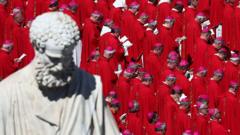This article delves into the elaborate security measures and intense scrutiny surrounding the papal conclave where cardinals will select a new pope in an environment shielded from external influence, highlighting the interplay between secrecy, faith, and politics.
The Vatican's Cloistered Conclave: A Secretive Selection of the Next Pope

The Vatican's Cloistered Conclave: A Secretive Selection of the Next Pope
As 133 cardinals prepare to gather for a historic vote enclosed from the outside world, the measures to ensure secrecy underscore the gravity of their task.
Just days away from one of the most cloistered elections in history, 133 cardinals prepare to meet in the Vatican's Sistine Chapel to elect a successor to Pope Francis. This conclave is shrouded in an oath of confidentiality as each cardinal, along with accompanying staff, pledges to protect its proceedings and discussions for eternity.
To avoid any breaches of privacy, the Vatican employs stringent measures. Electronic jammers and sweeps for listening devices are routine, ensuring a distraction-free environment during what is arguably the most significant choice in the Catholic Church. The chapel becomes an isolated chamber where cardinals are cut off from the outside world as they surrender all digital communication devices, ensuring the sanctity of their discussions and votes.
The lockdown serves multiple purposes. It is not only to maintain the confidentiality of the voting process but also to guard against any attempts by outside parties to influence the cardinals. The Vatican's own police enforce compliance to these rules, which forbids any form of external communication for participants.
While official commentary is restricted, media interest intensifies in the days leading up to the conclave. Reporters have eagerly pursued the 'cardinal-hunt,' speculating on potential replacement candidates since the day Pope Francis's passing was announced. Dining establishments near the Vatican become hotspots for probing unguarded moments of cardinals, but most witnesses deny any insider information.
With close to 250 cardinals in Rome for the election, much of the speculation comes from visual clues and subtle interactions rather than direct comments. These cardinals seek unity, emphasizing a focus on spiritual guidance rather than political maneuvering or public opinion.
Despite an insistence on keeping the vote strictly religious, the reality is that the pope leads a global institution with tremendous influence. Various factions push their agendas, analyzing potential candidates through media channels while maintaining that the Holy Spirit guides the final decision. As the conclave approaches, past attempts at influencing the election demonstrate the intricate blend of holy devotion and real-world politics.
Ultimately, the conclave is set to begin under an atmosphere of anticipation and secrecy. By Wednesday morning, cardinals will be settled in isolation, leaving external pressures behind as they navigate personal connections and divine inspiration in their quest for a new leader for the Catholic Church.



















